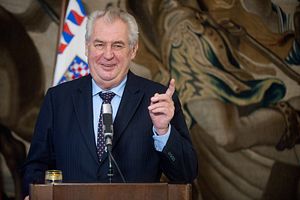Chinese President Xi Jinping is in the Czech Republic, the first stop on an overseas tour that will also bring him to Washington, D.C. for the Nuclear Security Summit later this week. Xi arrived in Prague on Monday and will depart on Wednesday for the United States.
Xi’s visit to the Czech Republic comes amid a broader push to deepen China’s relations with Central and Eastern European countries. Working under the China-Central and Eastern Europe 16+1 platform, China and the CEE states have held an annual leaders’ meeting each year since 2012. Last year, for the first time, the summit was held in China rather than Europe, with Premier Li Keqiang welcoming his counterparts to Suzhou. That summit saw China sign deals to construct a high-speed railroad linking Budapest and Belgrade, as well as promising to invest in unnamed “ports and industrial parks of the coastal areas of the Adriatic Sea, the Baltic Sea and the Black Sea.”
Beijing views the CEE states as a window to broader relations with Europe as a whole, particularly under the framework of Xi’s “Belt and Road” initiative. The countries of Central and Eastern Europe will be crucial links between the Central Asian and Russian legs of the Silk Road Economic Belt and the final destinations in Western Europe. Meanwhile, as Richard Turcsanyi has discussed for The Diplomat, many Central and Eastern European countries are eager to claim a position as China’s “bridge to Europe,” with all the economic benefits that could entail.
Turcsanyi notes that the Czech Republic, in particular, has been moving to rapidly increase its ties with China under President Milos Zeman – although there are debates in Prague over the wisdom of the current approach. Zeman has visited China twice in the past two years, most recently for Beijing’s massive military parade to celebrate the 70th anniversary of the end of World War II. Notably, Zeman was the only sitting Western leader to make the trek to Beijing for the celebration. Two months later, during the China-CEE summit in Suzhou, the Czech Republic signed an MoU with China pledging to cooperate on the “Belt and Road”
China reciprocated such gestures by selecting the Czech Republic as the site of Xi’s first presidential visit to a CEE state. In fact, this is the first visit ever by a Chinese president to the Czech Republic, according to China’s ambassador to the European Union, Yang Yanyi. Also according to Yang, China-Czech relations are currently enjoying their best period since the two established diplomatic ties 67 years ago.
The two sides took their relationship a step further on Tuesday, inking a strategic partnership. As part of that agreement, China and the Czech Republic will set up a new strategic dialogue mechanism to further develop ties, according to a joint statement issued after talks between Xi and Zeman.
Echoing the “bridge to Europe” theme, Zeman said that the Czech Republic is committed to becoming a hub in the China-EU trade network. The Czech president also assured Xi that his country will go to bat on China’s behalf in the European Union. “The Czech Republic is a country that can be trusted by China in the EU and is willing to fully utilize its influence to help further strengthen China’s relations with the EU and the CEE region,” Xinhua paraphrased Zeman as saying.
Not everyone in the Czech Republic shares those sentiments, however. Protesters concerned about Chinese human rights violations are making their objections to Xi’s visit known. Twelve protesters were arrested on Monday after replacing Chinese flags with Tibetan ones along a road leading from the airport to downtown Prague. More pro-Tibetan protesters clashed with Xi’s supporters when the latter group tried to cover up an enlarged picture showing the Dalai Lama with former Czech President (and noted dissident) Vaclav Havel.
The Czech opposition also made their reservations about Zeman’s pro-China stance crystal clear. Miroslav Kalousek, a former Czech finance minister and currently the chair of conservative opposition party TOP 09, accused Zeman of “bootlicking authoritarian and unfree regimes.” Meanwhile, Petr Fiala, the chair of the Civic Democrats or ODS – which headed the previous Czech government — tweeted, “Developing economic relations with China is right, but we cannot fall on our knees and deny our professed values.”
Zeman came under special fire from his critics for suggesting that the Czech Republic’s previous criticisms of China had been merely the result of pressure from the United States and the EU. “[T]here was a very bad relationship between China and the former government of the Czech Republic… Because this [former] government has been very submissive to pressure from the United States and the European Union,” Zeman told Chinese television in an interview. “Now we are again an independent country and we form our foreign policy which is very based on our own interests.”

































